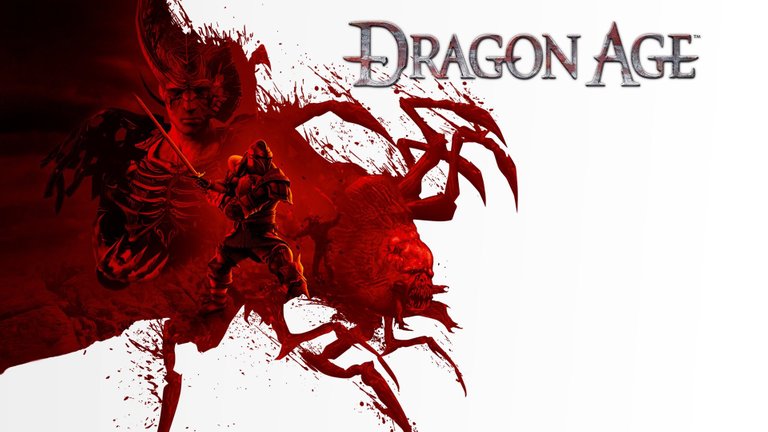The classic gaming bible returns this week to take a look at a more modern classic that many a gamer has high opinions of. We’ll be sticking with the general theme of fantasy and mythology that we took a look at with last week’s entry, Altered Beast, but this game is an entirely different animal altogether and one that helped to further BioWare’s reputation as the RPG juggernaut that we know and love today.
So what made Dragon Age: Origins such a brilliant game? It’s probably about time we found out.

The Backstory
By the time Dragon Age was under development, BioWare had already established its reputation as a purveyor of quality action-RPG games. The Edmonton studio, which handled development duties on this title, had already produced the spectacular Neverwinter Nights and the criminally underrated Jade Empire, so the game was in damn fine hands from the get-go.
Players choose from six classes and origin stories, all of which bleed into the main plot. Regardless of origin, the player will eventually become a part of the Grey Wardens, who are a collective of the world’s finest warriors. Their job is to destroy any Darkspawn that they discover to prevent a Blight that would overwhelm the kingdom of Ferelden and plunge everything into darkness.
After joining the ranks of the Grey Wardens, the player embarks on a quest to unite the various factions in Ferelden, all the while dealing with intrigue, betrayal and the efforts of a number of people to pin all of the blame for the re-emergence of the Darkspawn on the Wardens themselves.
The Game
If you have ever played a BioWare action-RPG before, it is likely that the general mechanics of the game will be quite familiar to you. You gather a party of like-minded – or not in some cases – companions and do battle with the Darkspawn that you encounter, alongside other beasties, bandits and bad guys. Over time you will earn experience points that can be used to bolster your skills, making you an even more formidable foe in combat. These abilities will differ depending on the class and race you choose at the beginning of the game, so it is important to consider your playstyle from the off and how your choices will affect you later in the game.
The player can be accompanied by as many as three companions when questing, but many more will be met along the way, giving you the chance to create teams that are strategically well-placed to take on the horrors ahead. Careful selection is crucial, as picking the wrong warriors for the job could see your team slain in an instant.
Interestingly, you have the chance to interact with each of your companions on an individual basis at regular points throughout the game. Each character’s allegiance to you and the cause can be altered based on the actions you take and the dialogue options you select when speaking to them. As characters become more enamoured by you, they will receive boosts in morale and become stronger in combat, plus you may even unlock a few character specific quests that solidify your relationships. Choose poorly and those links are never established, which can lead to dire consequences for some of the team, in addition to infighting and even betrayal.
Choice, as you may have gathered, plays a large role in the game. The actions you take and the decisions you make will influence a lot of the events that you experience later on. As with most morality and choice systems, it is perhaps not as deep as you might want it to be and most decisions can be fairly easily broken down into good and bad. Still, it offers the player the chance to play the game however they want to, which can make the overall plot more interesting as a result.
It wouldn’t be an action-RPG without a ton of side-quests to distract away from the terrible and urgent threat that the world faces. Many of the characters you meet will ask you to do things for them. Of course, you can choose to ignore all of this and just get on with the job at hand, but you will miss out on experience points, loot and a ton of other stuff if you do, plus there’s always the chance to learn more about the lore of the kingdom of Ferelden by interacting with others.
Despite this, the game is actually fairly linear in nature, especially when compared to the massively expansive worlds offered by the likes of Skyrim. There’s plenty to see and do, but you won’t spend ages traversing harsh terrain to get from town to town. Instead, there’s a handy little map that will make your journeys quicker, though you may get attacked or run into random encounters along the way.
The Rest
It’s quite a complex game and one that has aged very well since 2009. The graphics are still clean and crisp, though obviously not a patch on what the current generation of consoles has to offer, and you should find that it’s easy enough to navigate around the kingdom. There will be occasional patches of slowdown, especially on consoles when battles get particularly intense, but it’s nothing to get too worked up about, even though it can lead to delays in actions being taken and a failure to register the odd button press.
The soundtrack stands out as being particularly spectacular, so much so that it has been played live by symphony orchestras. It suits the mood of the game brilliantly, providing an added sense of urgency to your battles and blaring triumphantly when you achieve a major victory.
This is complemented by stellar voice acting. Though the player character doesn’t have a voice, the rest of the cast do and they pull off their roles very well. Alistair and Morrigan’s voice actors deserve special kudos, but this is a game produced during an era when voice acting in games was being taken more seriously and it shows.
I suppose the only bugbear, if there has to be one, is that the game feels mechanically similar to BioWare games of the past, right down to the approval system with characters, which has been seen in everything from Knights of the Old Republic through to Mass Effect. It’s not really a knock, because there’s no point in fixing something that isn’t broken, but if you’re looking for innovation in gameplay styles this is not the game for you.
The Aftermath
The game was eventually released on PC and consoles together, even though BioWare had originally intended to make it a PC-only release. This caused a few delays, but the quality of the title shone through and it received pretty unanimous praise, particularly for the quality of the soundtrack, the depth of the in-game world and the general setting.
A few were quick to point to the graphics as not being particularly stellar, even for their time, and it is true that a graphics fiend is likely not going to see much to wow them here.
Still, with such an enormous amount of content, which was later bolstered by a number of DLC packs, there really is no reasons not to give it a crack. The game won a number of ‘Game of the Year’ awards and started a franchise that has endured to this day, with Dragon Age: Inquisition following in fine form after the slightly disappointing Dragon Age II.
Collector’s Corner
As a fairly new and popular game, this one shouldn’t be too hard to find at all.
If you’re an Xbox 360 fan, you can pick the disc-based version of the game up for about a fiver in the UK, though you should expect to play closer to $10-15 in the US. Alternatively it is available in the Xbox Marketplace for £15/$15.
PS3 fans can expect the same sort of prices in the UK for the disc-based version, though US players will likely be able to pick it up for a little less than $10 with some searching. It is also available on the PSN Store at a lower price than the Xbox Marketplace equivalent.
PC gamers can pick it up on Steam fairly easily, again at around the £15/$15 mark, though it is often put on sale so it may be worth waiting around to see if you can get it a little cheaper. It should be pretty easy to run on most modern PC and laptops.
The Final Word
Dragon Age: Origins is another success story that has helped to define BioWare’s modern-day output. It is ideal for fans of the Elder Scrolls series and fantasy fans in general, as it presents a rich world that is absolutely full of fun quests and amazing characters. It is definitely worth picking up if you missed it the first time around, especially if you want to discover what the series has to offer before picking up Inquisition or you want to find out what all the fuss was about.
Really loved everything about this game. Couldn't beat the dragon at the end though... :(
Really nice game!
